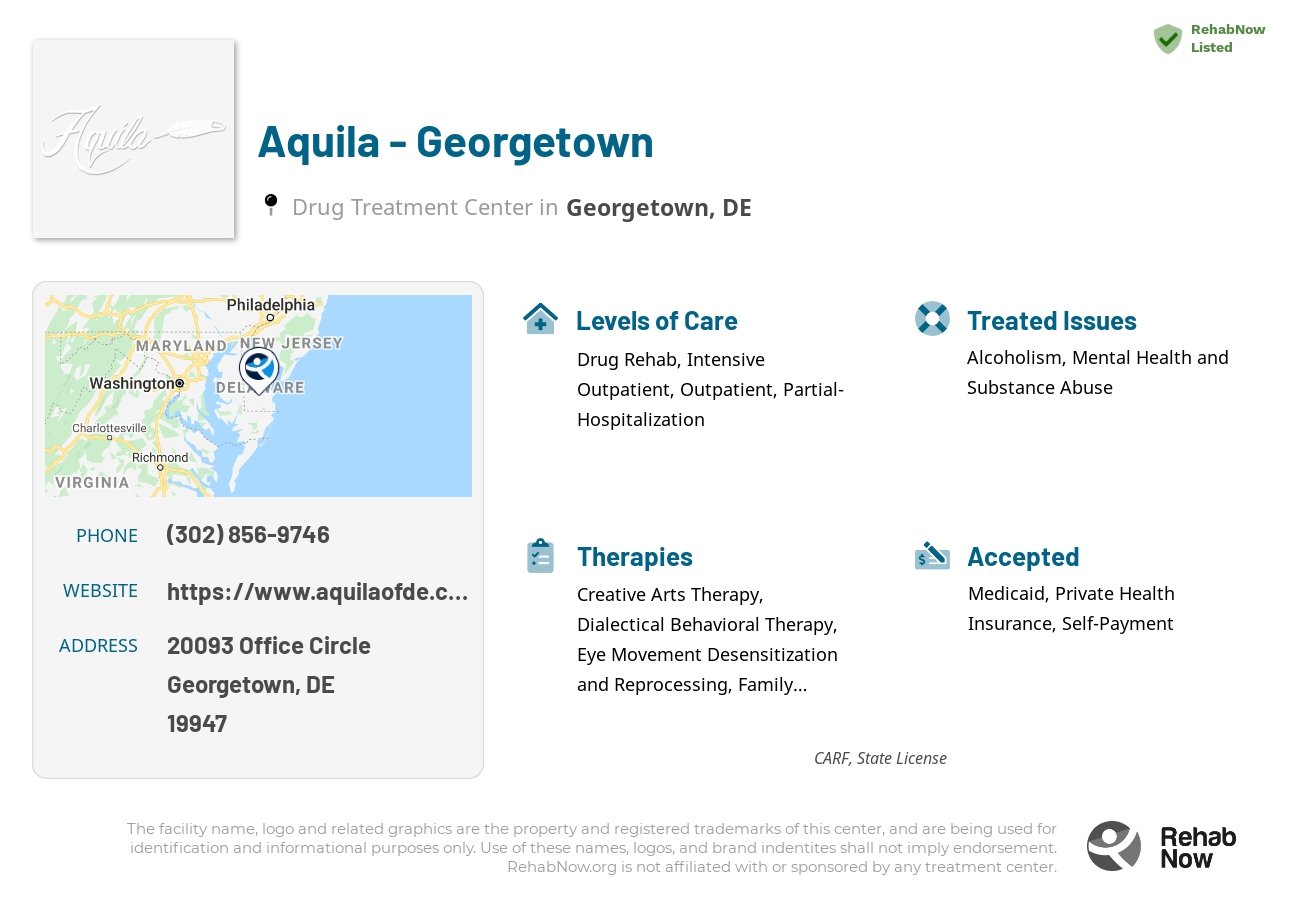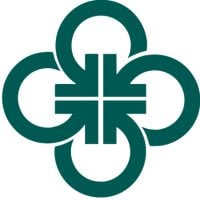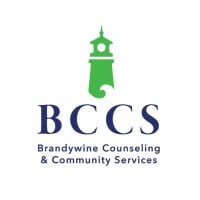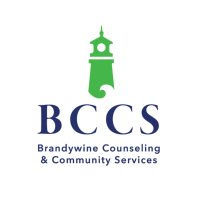Aquila - Georgetown
Drug Rehab Center in Georgetown, Delaware
Aquila - Georgetown provides an individualized and comprehensive drug rehab program with 24/7 addiction care, partial-hospitalization level of care, and private health insurance acceptance to help individuals navigate their addiction and establish a healthy recovery plan for long-term success.
About Aquila - Georgetown in Delaware
Aquila - Georgetown is an addiction treatment facility located in Georgetown, Delaware. This facility is accredited by CARF (Commission on Accreditation of Rehabilitation Facilities) and holds a State License, ensuring the highest standards of quality and care. Aquila - Georgetown specializes in treating individuals suffering from alcoholism, drug addiction, dual diagnosis, and substance abuse issues. They offer a range of levels of care including drug rehab, intensive outpatient, outpatient, and partial-hospitalization, providing individuals with flexible options for recovery. Aquila - Georgetown accepts private health insurance, making treatment accessible for those with insurance coverage.
At Aquila - Georgetown, individuals struggling with addiction and substance abuse can find a wide range of services to support their recovery journey. The facility offers drug rehab programs designed to address the specific needs of each individual, providing a comprehensive and personalized treatment approach. They also provide intensive outpatient programs, allowing individuals to receive treatment while maintaining their daily responsibilities and commitments. Outpatient programs are available for those seeking ongoing support and guidance as they continue in their recovery. Additionally, Aquila - Georgetown offers partial-hospitalization programs, providing a higher level of care and support for individuals in need of more intensive treatment. With a focus on holistic healing and evidence-based treatment, Aquila - Georgetown aims to empower individuals to overcome their addiction and achieve lasting recovery.
Genders
Ages
Modality
Additional
Accreditations
State License

CARF
The Commission on Accreditation of Rehabilitation Facilities (CARF) is a non-profit organization that specifically accredits rehab organizations. Founded in 1966, CARF's, mission is to help service providers like rehab facilities maintain high standards of care.
Conditions and Issues Treated
A combination of treatments is often needed to treat drug abuse. Some addictions can be treated with counseling and support groups. In other cases, drug abuse can lead to a medical problem and require medical treatment. Treatment for drug addiction typically combines counseling and psychotherapy with medication and behavioral therapies.
A combination of treatments is often needed to treat drug abuse issues effectively. In the case of drug abuse, there is no easy answer or one-size-fits-all cure.
Levels of Care Offered
This center offers a variety of custom treatment tailored to individual recovery. Currently available are Drug Rehab, Intensive Outpatient, Outpatient, Partial-Hospitalization, with additional therapies available as listed below.
The Intensive Outpatient Program offered by Aquila - Georgetown is designed for those who need intensive care but would rather get it in the comfort of their own home. The treatment programs vary in duration and intensity and can be tailored to suit the patient’s needs. The program includes regular visits to the facility, though the overnight stay is not needed. IOP is suitable for patients who have been treated in residential treatment programs and are in the transition phase. It helps the patient live at home and discharge some work or school responsibilities even while undergoing treatment. The patients gradually get back to their routine life with the support of a friend or family member.
Outpatient treatment is often used for drug addicts in drug rehab. Outpatient treatment consists of counseling and therapy sessions. This form of treatment is also called ‘day-treatment’. The outpatient treatment process begins with the addict’s initial detox period, lasting about ten days.
Outpatient treatment is used for those who are at moderate risk for ‘slipping back’ into the addiction, for those who:
- Are not currently experiencing any side effects from withdrawal and can handle social pressure
- Can handle stressors that might trigger relapse
- Have a stable living environment or have moved out of their previous environment, which was not conducive to being sober
- Have a support system that allows them to go to a facility a few times a week while still keeping their current responsibilities
- Have no legal obligations, being either on parole or probation, that require them to seek treatment at a mandatory facility
- Are not currently experiencing any side effects from withdrawal and can handle social pressure
- Have a stable living environment or have moved out of their previous environment, which was not conducive to being sober
Partial hospitalization programs offer another level of addiction treatment at Aquila - Georgetown.
Therapies & Programs
Because no single treatment is effective for all addicts, the goal of treatment and therapy should be to figure out what works best for each individual. Tolerance and withdrawal levels differ from person to person, affecting the treatment intensity required. Addiction treatment should aim to help addicts develop healthy coping mechanisms for dealing with their addiction and its underlying causes.
Family therapy is beneficial for people who are in addiction treatment services because it offers addicts the opportunity to work with their family members to better understand what led them to make choices that contributed to their addiction.
This type of therapy helps family members reach a deeper understanding of how they can best support their loved one during recovery. It also helps the addict better understand their own motivations and triggers that led them to turn to substance abuse.
Family therapy can help addicts in the following ways:
- Assists family members in processing difficult feelings so they don’t blame or resent recovering addicts
- Assists family members in understanding how addiction has impacted the addict and everyone who is involved with them
- Allows the addict to take responsibility for their actions, while encouraging improved communication skills
- Helps family members understand how to best support an individual in recovery so addicts don’t relapse again.
Group therapy can help build a stronger support system and give addicts in Georgetown, DE insight into their addiction that they gain through shared conversations. Group therapy occurs in a controlled group environment, exclusive of one on one meetings. This makes it safer for patients to feel comfortable sharing the struggles they’re going through and gaining perspective.
Dialectical Behavior Therapy (DBT) is a cognitive-behavioral therapy that helps patients understand the relationship between their thoughts, feelings, and behaviors. It is beneficial for those whose addictions and behaviors stem from severe mental health issues. The term “Dialectic” means the integration of opposites. In substance abuse, DBT refers to accepting the patient’s addiction and working to change their thoughts and behavior. It improves life skills such as controlling intense emotions without reacting impulsively, resolving interpersonal conflicts effectively, and promoting awareness about self and others.
Cognitive-behavioral therapy is a technique that is used to help people with addiction. Specifically, it is a way of identifying thoughts and behaviors that cause the addiction. It is typically used in an individual counseling session.
The content explains cognitive behavioral therapy and how it works to address some behaviors that may be leading to unintended consequences in their life, as well as its benefits for those seeking sobriety.
It works by helping people to talk through their issues and addressing the thoughts that cause said behaviors. It is an excellent way of learning about oneself and one’s perception of the world.
Eye Movement Desensitization and Reprocessing (EMDR) helps people get sober by changing how they experience emotions. EMDR is a psychotherapy treatment that has been widely studied with people who have addiction problems.
During the treatment, the patient is asked to recall specific memories that relate to their addictions. At the same time, they follow a moving object with their eyes or tap their hands or feet. This process helps the patient work through their emotions by separating the memory from the distress they feel about it.
By enhancing the brain’s information processing systems, EMDR enables people to “process” experiences that trigger cravings and painful emotions so that they can move forward in their lives.
The 12-step program is a common method used to treat addiction. It is successful for many people and includes acknowledging the problem, making changes, and honesty. The program is available in most cities in the United States and helps those addicted to drugs or alcohol achieve sobriety. In this program, peers help each other achieve the goal of abstinence.
The 12 steps dictate that individuals accept that they are addicts and understand the consequences of their addiction. They then work towards recovery and make amends to others they have hurt. The process of cognitive restructuring helps individuals change their negative thoughts into positive ones. The 12-step program provides the benefit of building a support network, which is essential for recovery.
Payment Options Accepted
For specific insurance or payment methods please contact us.
Is your insurance accepted?
Ask an expert, call (888) 674-0062
Aquila Associated Centers
Discover treatment facilities under the same provider.
- The Refuge in Bear, DE
- Aquila of Delaware in Dover, DE
- Aquila - Wilmington in Wilmington, DE
- Aquila - Dover in Dover, DE
- Aquila - Wilmington in Wilmington, DE
Learn More About Aquila Centers
Additional Details
Specifics, location, and helpful extra information.
Georgetown, Delaware 19947 Phone Number(302) 856-9746 Meta DetailsUpdated November 25, 2023
Staff Verified
Aquila - Georgetown Patient Reviews
There are no reviews yet. Be the first one to write one.
Georgetown, Delaware Addiction Information
The Delaware substance abuse statistics show that the number of deaths due to drug injury is higher than the national average. Over 16% of all deaths in the state between 2008 and 2017 were caused by drugs and alcohol. The state has been rolling out more services to address addiction in an effort to get help to those who need it.
In Georgetown, DE, the problem is especially acute. 12.62% of adults in Georgetown reported past-year illicit drug use. 38% of Georgetown residents who use illicit drugs are aged 18 to 25. There are many types of substances that people abuse in Georgetown, including alcohol, prescription drugs, and illicit substances like heroin and methamphetamine. After treatment, it is important to maintain your sobriety by attending support groups, therapy, and staying away from triggers.
Treatment in Nearby Cities
- Ellendale, DE (7.3 mi.)
- Wilmington, DE (72.5 mi.)
- Selbyville, DE (19.4 mi.)
- Dover, DE (32.2 mi.)
- Lewes, DE (15.0 mi.)
Centers near Aquila - Georgetown
The facility name, logo and brand are the property and registered trademarks of Aquila - Georgetown, and are being used for identification and informational purposes only. Use of these names, logos and brands shall not imply endorsement. RehabNow.org is not affiliated with or sponsored by Aquila - Georgetown.









